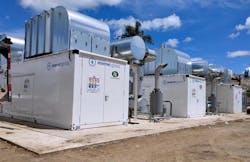MPC Energy Solutions acquires 3.4 MW CHP supplying Pharmaceutical in Puerto Rico
MPC Energy Solutions has acquired a 3.4 MW Combined Heat and Power (CHP) plant in Caguas, Puerto Rico for $9 million.
The plant is now generating its first kWhs. The power generated from this facility will be supplied to pharmaceutical company Neolpharma Inc., under a long-term Power Purchase Agreement.
The Neol CHP plant is expected to produce 26,000 MWh of energy per year. Neolpharma will benefit from the PPA as it will provide a stable supply and reduce thermal energy consumption. It will result in substantial environmental benefits. The plant is expected to help avoid 100,000 tons of CO2 emissions over the tenure of the PPA.
MPC Energy Solutions CEO Martin Vogt said, “The commissioning of Neol CHP is another important step in terms of executing on our project pipeline and a demonstration of MPC Energy Solution’s commitment to Puerto Rico. The territory has an ambitious target to transition to 100% renewable energy by 2050. Projects such as the Neol CHP power plant are a part of that transition.”
The project was developed by Enernet Global. MPCES and Enernet Global intend to develop and construct additional sustainable energy projects like this for the Puerto Rican private sector this year with an aim to reduce cabon emissions and transition towards clean energy.
About the Author
EnergyTech Staff
Rod Walton is head of content for EnergyTech.com. He has spent 17 years covering the energy industry as a newspaper and trade journalist.
Walton formerly was energy writer and business editor at the Tulsa World. Later, he spent six years covering the electricity power sector for Pennwell and Clarion Events. He joined Endeavor and EnergyTech in November 2021.
He can be reached at [email protected].
EnergyTech is focused on the mission critical and large-scale energy users and their sustainability and resiliency goals. These include the commercial and industrial sectors, as well as the military, universities, data centers and microgrids.
Many large-scale energy users such as Fortune 500 companies, and mission-critical users such as military bases, universities, healthcare facilities, public safety and data centers, shifting their energy priorities to reach net-zero carbon goals within the coming decades. These include plans for renewable energy power purchase agreements, but also on-site resiliency projects such as microgrids, combined heat and power, rooftop solar, energy storage, digitalization and building efficiency upgrades.
